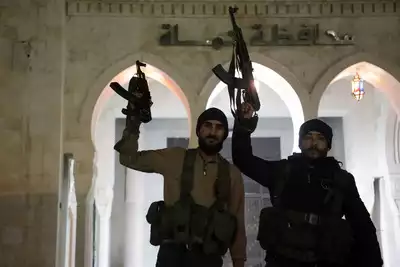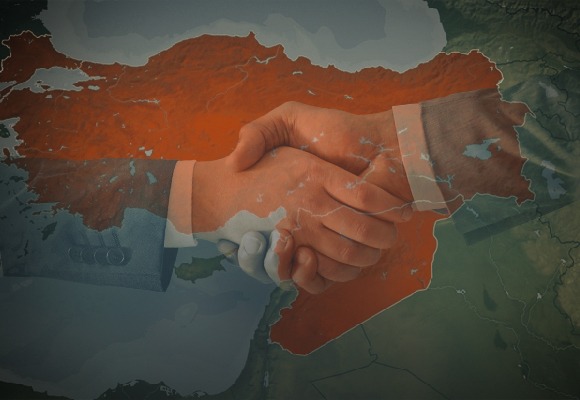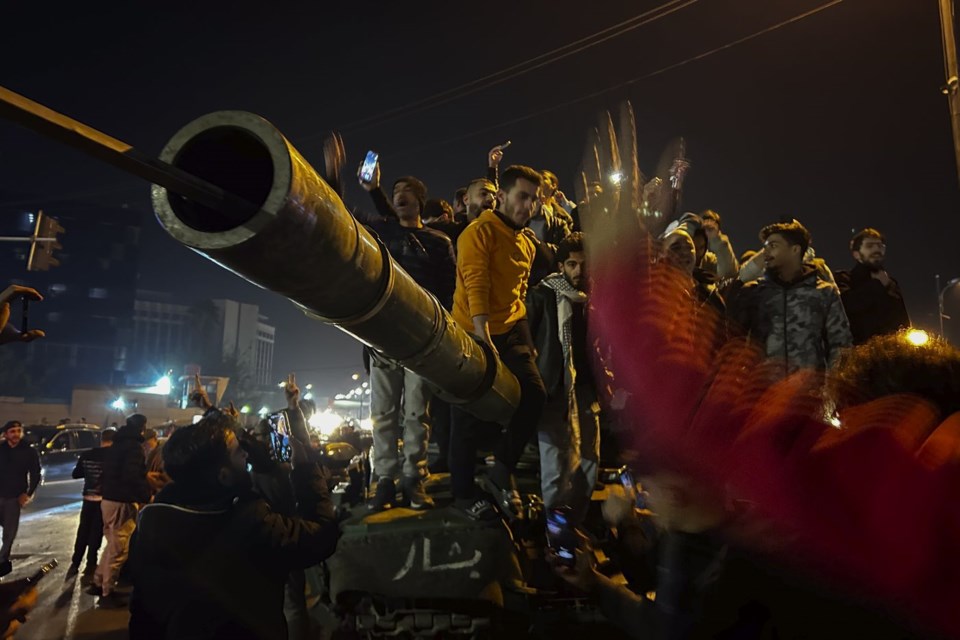Osman Softic || 11 December 2024
 The Syrian armed rebels led and dominated by Hay’at Tahrir al-Sham (HTS) – Committee for the Liberation of Levant (originally known as Al Qaeda- which had later been transformed into Al-Nusra Front), launched the surprise offensive against the Syrian government forces some eleven days ago. HTS swept across Syrian countryside, from their stronghold of Idlib province in northwest and taking control of all the major population centers southward, capturing Aleppo, Hama and Homs, finally encircling and storming the capital Damascus without facing any resistance by the now defunct Syrian Arab Army (SAA), whose commanders (rank and file) and conscripted soldiers abandoned their defensive positions without offering any serious resistance.
The Syrian armed rebels led and dominated by Hay’at Tahrir al-Sham (HTS) – Committee for the Liberation of Levant (originally known as Al Qaeda- which had later been transformed into Al-Nusra Front), launched the surprise offensive against the Syrian government forces some eleven days ago. HTS swept across Syrian countryside, from their stronghold of Idlib province in northwest and taking control of all the major population centers southward, capturing Aleppo, Hama and Homs, finally encircling and storming the capital Damascus without facing any resistance by the now defunct Syrian Arab Army (SAA), whose commanders (rank and file) and conscripted soldiers abandoned their defensive positions without offering any serious resistance.
SAA fighters became demoralized by many years of miserable conditions, low wages, corruption, lack of hope and the clear road map for the future of Syria. All these as a result of American and Western-imposed maximum pressure economic sanctions against Damascus under the auspices of the infamous Caesar Act passed by the US Congress in 2019.
The HTS rebels’ lightning offensive which some analysts called the Syrian opposition blitzkrieg has caught even the most astute observers of the Middle East by surprise, as there was no indication it could even happen let alone be executed so rapidly and meticulously. Some analysts even compared it with the Israeli Six-day war of 1967, when Israeli occupation army swiftly took control and occupied vast swaths of Arab territories in Palestine, Syria, Lebanon and Egypt, by defeating major Arab states’ armies at the time (territories Israel ended up keeping to this day contrary to international law), and even expanding further to now control the UN supervised buffer zone in the Golan Heights designed to keep the Syrian and Israeli army at each other’s lengths after the 1967 conflagration.
Hay’at Tahrir al-Sham (HTS) – the terrorist organization
Interestingly enough, HTS has been designated a terrorist organization by the United States, United Kingdom, the EU and even Turkey (its main political backer and supporter). One of the most plausible explanations as to why the HTS rebels were so successful was their use of Ukrainian-made drones and other modern warfare tactics which HTS was able to muster during the past four years of the frozen conflict during which time they were able to become well trained and equipped under the protection of deconfliction agreement under the Astana peace process, which gave the false impression that the Assad regime in Damascus had prevailed for good, having entrenched its power, self-assured safe and secured by military support of his major allies, Russia, Iran and the Lebanese armed Shia militia known as Hezbollah.
The Syrian civil war which erupted in 2011, seemingly as a peaceful and spontaneous protest against the authoritarian regime in Damascus, had later acquired a much more sinister dimension and became a major regime change operation by the American CIA during the Obama administration (secret operation known officially as Timber Sycamore as revealed by WikiLeaks). The operation was later abandoned in 2017. was aimed at overthrowing the Assad regime by supporting the armed rebellion against the Syrian government which Australian academic Tim Anderson dubbed the Dirty War on Syria.
The conflict then became a proxy war, when the Assad government decided to call Iran and Russia for assistance, fearing it might be defeated by joint opposition forces and the ISIS and Al Qaeda terrorists supported secretly by western powers and financed by the Gulf monarchies. The war lasted for more than ten years before it became frozen conflict, due to inability of the Syrian Arab Army to defeat the last rebel stronghold of Idlib, and because its backers Russia and Iran did not allow Damascus to produce a clear victory, as it would inevitably have caused many civilian casualties and generated millions of new refugees which Turkey was not able to absorb.
The stalled diplomatic process in Astana hindered the political solution to end the war and begin the reconstruction of Syria. Russian and Turkish diplomatic maneuverings as part of the Astana peace process (which also included Iran as a major Muslim backer of the Assad regime in Damascus), failed to produce the final resolution for Syria as they all became frustrated by Damascus, and particularly by Bashar Al-Assad’s recalcitrance and inflexibility ultimately demonstrating his unwillingness to make any concessions and compromise with the rebels and failing to accommodate Turkey’s legitimate interests in Syria. Russian air strikes to push back HTS failed to prevent its advances in the absence of effective Syrian ground forces. Another crucial factor which weakened the Syrian army’s capacity to mount an effective defense was the timing of the offensive, which came immediately after the Israel-Hezbollah ceasefire deal when Hezbollah forces were decimated and all the major road communications between Lebanon and Syria were systematically bombed in days and weeks preceding the HTS operation.
The unholy alliance

Without a doubt it was well-coordinated operation, meticulously planned in advance by HTS and its backers Israel, US, Turkey (even though Ankara denied it), and some analysts even mentioned Ukraine, France and the CIA were involved, no matter the denial by Turkey and the US governments (only Israeli leader admitted it). Having weakened the Axis of Resistance in the region after the prolonged Gaza and Lebanon wars, it made perfect sense for the HTS to go on the offensive at this specific moment – something they’d clearly planned to do once all the dots had been connected. The sheer magnitude and ferocity of the offensive would not have been possible without Turkey’s knowledge and active support, despite Ankara’s formal designation of HTS as a terrorist organization.
It needs to be stated that Turkey’s president Recep Tayyip Erdogan’s interpretation of what he perceived to be Turkey’s national interest coincided with the Israeli plans to dethrone Assad and demolish Syria’s capacity, (not to resist Israel for the Assad regime had not actively resisted or fought Israel for many years, rather it sat on the sidelines), but to eliminate Syria’s capacity to serve as the only road corridor for transportation and supply of Iranian weapons to Hezbollah in Lebanon and Hamas in Gaza via Iraqi territory, which the American military presence in Syria, particularly at the Al-Tanf base, was designed to prevent.
Hence, the common interests of Israel converged with Erdogan’s desire to do away with Assad who continuously refused to accommodate Ankara’s demands and reach a compromise with the non-terrorist opposition to his regime. It would probably be farfetched and unfair to accuse Erdogan and Turkey for deliberately colluding with Israeli war criminal Netanyahu, with whom Erdogan diverge markedly on the issue of Palestine, but the sheer circumstances converged in such a way to produce this tacit understanding between the two otherwise disparate players, over the common goal to ousting Assad and executing the regime change in Syria.
Turkey’s strategic objectives in HTS’ offensive may have been more modest initially, namely to coerce Damascus into granting autonomy to the Islamists under its influence in the northwest Syria’s Idlib province. It is very unlikely Ankara would agree to do the same in the northeast, given the current Kurdish terrorist YPG under the US protection was able to carve out its Kurdish autonomous territory, unless Erdogan is able to impose pro-Turkish Kurdish political forces in the region, provided the new incoming Trump administration in Washington agreed to withdraw its 900-strong troop presence from Syria, which at the time of writing is very unlikely prospect given both the American and Israeli support for the Kurdish groups in Syria. Another important objective that Turkey wants to secure is the return of refugees. Some analysts even speculated that Ankara may have wanted to help the Trump team to be able to concentrate on East Asia by ending the need to get bogged down in the Middle East.
It goes without saying that Turkish leadership was aware that Washington will look favorably to Ankara and HTS operations in Syria at the time of intensive NATO activity in Ukraine against Russia and Russia’s purported advances on the frontlines, hoping that Russia too may pressure Assad to accept concessions. We can now see that both Russia and Iran, for their own reasons, decided to abandon Assad, when they both realized, his forces were unwilling to resist the HTS assault. Both Tehran and Moscow realized that the Assad regime became an empty shell not worth spilling the blood for this time around, especially when it turned out that Assad became ready to fulfill every demand the US and Israel asked from him earlier on in the game, so they decided to throw him under the bus, so to speak. There is evidence that Assad refused to see an Iranian high official in his last days in power (after he held a meeting with Larijani, special advisor to Iran’s supreme leader Khamenei), and had decided to change sides for which it was too late.
The Western hypocrisy
 Both Russia and Iran decided that Assad was a non-reliable partner who exploited their protection for his own power purposes, while being rather ambivalent if not passive when it came to assisting the Palestinian cause, except symbolically. Nobody is able to predict for certain how the political development in Syria will unfold in the foreseeable future. However, one question begs an explanation: How was it possible that some of the worst (UN, US, EU and Turkey-designated terrorists) became the good guys and even democrats overnight. It is really worth-reflecting over the fact that the US and its allied western countries had disrupted the whole world and, in that process, created fear, distrust, confusion and chaos for the past 23 years, after the 9/11 tragedy, all under the pretext of fighting the Al-Qaida and later the ISIS terrorism. They created mayhem all over the place.
Both Russia and Iran decided that Assad was a non-reliable partner who exploited their protection for his own power purposes, while being rather ambivalent if not passive when it came to assisting the Palestinian cause, except symbolically. Nobody is able to predict for certain how the political development in Syria will unfold in the foreseeable future. However, one question begs an explanation: How was it possible that some of the worst (UN, US, EU and Turkey-designated terrorists) became the good guys and even democrats overnight. It is really worth-reflecting over the fact that the US and its allied western countries had disrupted the whole world and, in that process, created fear, distrust, confusion and chaos for the past 23 years, after the 9/11 tragedy, all under the pretext of fighting the Al-Qaida and later the ISIS terrorism. They created mayhem all over the place.
The UN even went so far as to design globally embraced programs known as Countering Violent Extremism (CVE) worth billions and the entire industries were mobilized around it, spanning law enforcement, academia, media and faith communities. Then after two decades or so, the same western powers that wanted us to actively engage our communities and intellectual capacities against terrorism, now suddenly want us to believe that terrorists they themselves designated as such and had allegedly been fighting against, both in the Arab/Muslim world and in the west, for more than two decades, have suddenly become transformed into freedom fighters, good guys, and even democrats, whom we are now expected to embrace.
It seems that the basic and universal values we share have now become so malleable to the extent that global terrorism, in a bizarre twist of events, had overnight turned into a desirable democracy when it so suites Israel and the United States’s interests in the Middle East, while at the same time the same western powers not only failed to prevent but are actively supporting the genocide against the Palestinians in Gaza and Lebanon and the destruction of their lives and infrastructure.
On a broader, strategic level, it is plainly obvious, as argued by Seyed Hossein Mousavian of the Princeton University in New Jersey in his recent article published by the Middle East Eye (former high-powered Iranian diplomat, national security official and nuclear policy expert), Russian and Iranian influence in the region is now significantly weakened if not totally disappeared. Mousavian admits that in the short term, Iran, Russia, Iraq and the Axis of Resistance will be the main losers from Assad’s downfall as Iran’s geopolitical influence in the region is now weakened markedly. Iran’s leverage in the Palestinian struggle suffered a heavy blow. Iran will face serious risks of its security being threatened from Syriana and perhaps even Iraqi territory in the future should regime change in Iran become an obsession of Israel and the Trump administration in the future.
Mousavian admits Turkey has become a main winner in the geopolitical game in Syria. I would argue that Lebanon having been battered by Israel may experience heightened instability and even a renewal of sectarian conflict if the HTS-led administration in Damascus decides in cohort with Israel and the US to undermine the political power of Hezbollah and attempt to shift the balance of political and sectarian power in Lebanon away from Hezbollah to the Sunni Muslim Salafi camp which may now be emboldened by the victory of their likeminded force in Syria. However, given the important role of Lebanese Christians in political process it is unlikely that Lebanon’s major Christian factions such as Free Patriotic Movement and Marada will end up supporting Salafi HTS sympathizers in Lebanon, although Lebanese Forces party led by Samir Gea’gea, who enjoys American and Saudi support, may be tempted, if encouraged by Israel, to embrace the agenda of HTS, despite some contradictions.
The path forward
 It is still unclear what stand the new Syrian rulers will take towards Israel and Palestine. Israel has already destroyed the remaining military capacities of Syria, in case HTS decides it needs to bolster its Islamic credentials by confronting Israel at some stage in the near future. Netanyahu surely had this scenario in mind when he launched air raids on Syria in the last few days in order to degrade the Syrian military arsenal just as he did earlier against Hezbollah. According to Mousavian, Arab countries are pleased with the reduction of Iran’s influence in Syria. However, given the military operations of HTS and other militant groups were managed and organized by Turkey and all of them have some sort of ideological affiliation with the Muslim Brotherhood, many Arab monarchies and Egypt may regret the situation as the new rulers in Damascus may be compelled to do Turkey’s bidding. This will ultimately become contrary to Arab countries preferred policy options. Hence, as much they may be gloating about Assad’s downfall and Iran’s setback, it may later come to haunt them as they will be ideological foes rather than friends of HTS-dominated Damascus. Therefore, it is too early to be jubilant about the new developments in Syria. There are many different variables in play and all sorts of possible scenarios may develop in the future. But for now, at least the majority of Syrian people, who had suffered tremendously during the past decade and a half, deserve respite, peace and security. At least for now, geopolitical games could take a back seat.
It is still unclear what stand the new Syrian rulers will take towards Israel and Palestine. Israel has already destroyed the remaining military capacities of Syria, in case HTS decides it needs to bolster its Islamic credentials by confronting Israel at some stage in the near future. Netanyahu surely had this scenario in mind when he launched air raids on Syria in the last few days in order to degrade the Syrian military arsenal just as he did earlier against Hezbollah. According to Mousavian, Arab countries are pleased with the reduction of Iran’s influence in Syria. However, given the military operations of HTS and other militant groups were managed and organized by Turkey and all of them have some sort of ideological affiliation with the Muslim Brotherhood, many Arab monarchies and Egypt may regret the situation as the new rulers in Damascus may be compelled to do Turkey’s bidding. This will ultimately become contrary to Arab countries preferred policy options. Hence, as much they may be gloating about Assad’s downfall and Iran’s setback, it may later come to haunt them as they will be ideological foes rather than friends of HTS-dominated Damascus. Therefore, it is too early to be jubilant about the new developments in Syria. There are many different variables in play and all sorts of possible scenarios may develop in the future. But for now, at least the majority of Syrian people, who had suffered tremendously during the past decade and a half, deserve respite, peace and security. At least for now, geopolitical games could take a back seat.
 Osman Softić is a Research Fellow at the Islamic Renaissance Front. He holds a BA degree in Islamic Studies from the Faculty of Islamic Studies of the University of Sarajevo and has a Master degree in International Relations from the University of New South Wales (UNSW). He contributed commentaries on Middle Eastern and Islamic Affairs for the web portal Al Jazeera Balkans, Online Opinion, Engage and Open Democracy. Osman holds dual Bosnian and Australian citizenship.
Osman Softić is a Research Fellow at the Islamic Renaissance Front. He holds a BA degree in Islamic Studies from the Faculty of Islamic Studies of the University of Sarajevo and has a Master degree in International Relations from the University of New South Wales (UNSW). He contributed commentaries on Middle Eastern and Islamic Affairs for the web portal Al Jazeera Balkans, Online Opinion, Engage and Open Democracy. Osman holds dual Bosnian and Australian citizenship.

